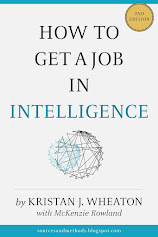Previous Posts In This Series:
Part 1 -- Let's Kill The Intelligence Cycle
Part 2 -- "We''ll Return To Our Regularly Scheduled Programming In Just A Minute..."
Intelligence is not something that appears, autogenously; it is something that gets done, a process. This idea, that intelligence is a process, is one of the least controversial among intelligence professionals.
However, a general description of the process of intelligence -- that is, the best way to characterize and classify those consistent elements across intelligence sub-disciplines --is still very much an open theoretical question.
Intelligence professionals have long known that the traditional way of describing the intelligence process, the so-called "intelligence cycle", is flawed; yet none of the alternatives proposed has yet captured the nuance of the process as practiced or, for that matter, the mind of the intelligence community.
This disconnect between theory and practice, between the imperfections of the intelligence cycle and the way intelligence is actually done, has real-world consequences. While I will return to this theme many times throughout this series of posts, it is useful to get a sense of the costs associated with perpetuating a faulty model of the process.
- For example, without a consensus on the way in which intelligence "happens" that works across the various sub-disciplines of law enforcement, business and national security intelligence, it is impossible to study the process for potential improvements.
- In addition, reforms proposed under flawed models are likely to be flawed reforms, incapable of solving systemic problems because the system itself is so poorly understood.
- Furthermore, training students with models of a process that falls apart when first touched by reality reduces the perceived value of training as well as the morale of those trained.
- Budgets built around a flawed model are likely to mis-allocate funds and require work-around solutions that consume even more scarce resources.
- Hiring people to fill positions created under an unsound model of the process is nearly certain to create a mismatch in terms of skills and competencies needeed vs. skills and competencies acquired.
In this series of posts, I will begin by examining the intelligence cycle and some of the critiques of it. Next, I will examine the alternatives to the intelligence cycle. Finally, I will lay out my own understanding of the process. While every intelligence project is different, my own experience and the evidence I have collected over the last eight years indicates that there are patterns in this activity, whether in the national security, business or law enforcement fields, that are consistent across the entire intelligence profession.
The final goal of this exercise, then, is to outline this new description of the process as clearly as possible based on intelligence, as it is practiced, across all its sub-disciplines and regardless of the size of the intelligence activity involved. Furthermore, I want to balance the need for both simplicity and detail such that this explanation of the process is accessible to all students of intelligence -- at whatever age or level of experience.
Next: The Generic Cycle





5 comments:
One additional aspect is the ability to correctly identify the systemic gaps in technology and hw/sw necessary to perform the functions of the process in both an economical and effective manner (both in process and cost). Without the model, there is no way to simulate the process(es) for detailed analysis.
Harry,
Excellent point! I have had the chance to talk to a number of software developers who were frustrated trying to develop tools for "analysts" or "collectors" as independent parts of a sequential process.
Kris
In the end it is the operator, the person behind the system. There is, and will be no "software solutions" but rather only human solutions to human problems. This entire effort in Afghanistan could be accomplished with a pencil and legal pad, if human participants were empowered to achieve victory. Modern technology and computer systems are wonder tools enabling us to hand massive amounts of data and accomplomish huge volumes of work, but only when the human behind the system is empowered to do so.
Vr, Al
Software tools are most valuable in handling repetative tasks rapidly and without bias. They find things irrespective of how ridiculous they may believe because they have no beliefs. Humans do!
How often have the readers of this posting reviewed a paper or other writing prior to publishing...only to find or have someone else find a major error after publishing? The error has always been there, the mind simply refused to see it.
SW sold on the basis of being able to perform 'analysis' is only capable of actually performing data development. It can take disparent variables...many variables...more than a human can...and convert them into algorithmic results. Then, as Al stated, the human must make sense of it.
Kris,
While I agree with your general contention regarding the desirability of a better model, I think your bullet list argument is flawed in that it infers that all these key decisions are being made using the "simple" version of the cycle model and that organisations haven't evolved their own understanding of themselves beyond that.
For example, there is no way that budget allocation would rest solely on the int cycle model. One would be expected to base financial forecasts on actual activities to be undertaken, not what is theoretically prescribed. Likewise, hiring of staff would require a specific job description that reflects actual duties. You can't blame the int cycle model for these failures - if they have occured its because people haven't understood their day-to-day work, or more simply, have been bad managers.
Post a Comment